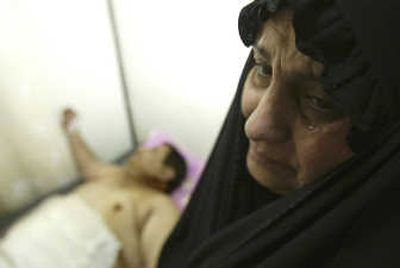3 Iraqi newspaper workers die

BAGHDAD – Three Iraqi newspaper employees were killed near Kirkuk on Monday when their convoy was ambushed by gunmen, the second deadly attack on Iraqi journalists in as many days.
Eyad Tariq, an editor of al-Watan, a weekly newspaper in Tikrit, was killed along with two security guards for the news organization after dropping off a colleague at the airport, according to Brig. Gen. Sarhad Qader, deputy police commander in Kirkuk, in northern Iraq. Two other journalists from the paper were injured.
“The journalism knights have been martyred,” the newspaper said in a statement.
Their deaths followed the execution-style killing Sunday of Salih Saif Aldin, a 32-year-old Washington Post journalist, who was shot in the head while covering sectarian violence in Baghdad’s volatile Sadiyah neighborhood.
Iraq is the most dangerous country in the world for journalists. Before Monday’s deaths, at least 119 reporters had been killed since the U.S.-led invasion in 2003, according to the New York-based Committee to Protect Journalists. Nearly all were Iraqis.
Violence continued to rage throughout Iraq. At least 55 people, including security forces, civilians and insurgents, were killed, or their bodies were recovered, in separate incidents across the country, according to the Interior Ministry. The toll was not abnormal by standards in Iraq.
In southern Iraq, clashes between Shiite militiamen and troops from the U.S.-led coalition left as many as five civilians dead and 28 wounded, police officials said.
The fighting began when members of the Mahdi Army, a militia led by radical Shiite cleric Muqtada al-Sadr, fired on Polish troops as they returned to a base in Diwaniyah, 80 miles south of Baghdad, then launched mortar rounds at the camp, the police said. They said Polish forces responded by bombing and destroying five homes.
The U.S. military said the fighting wounded two coalition soldiers, killed four civilians and wounded 12 additional civilians. The military said the attackers fled to a wooded area near the base and had so far avoided capture. No other details were released.
In the Shiite holy city of Najaf, one of Iraq’s most important political figures declared that he was in good health despite reports that that he was fatally ill with cancer.
Abdul Aziz al-Hakim, leader of the Supreme Iraqi Islamic Council, the largest Shiite group in the country, appeared at the organization’s headquarters to greet supporters and local leaders. He had been in Iran for six months being treated for lung cancer, and some analysts had feared that his death could unleash further political turmoil in Iraq.
Speaking to a large crowd, Hakim said he was thrilled to return to Najaf. “There was progress in the treatment and good results,” he said.